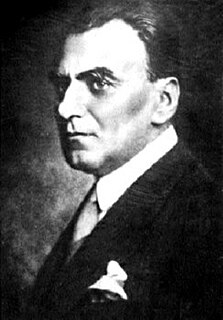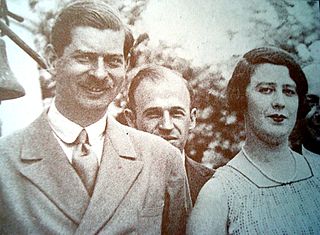 W
WConstantin Argetoianu was a Romanian politician, one of the best-known personalities of interwar Greater Romania, who served as the Prime Minister between 28 September and 23 November 1939. His memoirs, Memorii. Pentru cei de mâine. Amintiri din vremea celor de ieri —a cross section of Romanian society, were made known for the sharp critique of several major figures in Romanian politics.
 W
WMax Carol Auschnitt, also known as Ausschnitt, Auschnit or Aușnit, was a Romanian businessman and political figure, one of his country's most prominent industrialists during the interwar period. Born to Ukrainian Jewish immigrants, he spent much of his youth abroad, returning in the 1910s to set up business as an importer of sheet iron, greatly expanding his father's fortune after World War I. Auschnitt was caretaker, and from 1929 managing director, of the Iron Domains and Factory (UDR) of Reșița, as well as founder of Titan-Nădrag-Călan (TNC), regional partner of Vickers-Armstrongs, and investor in many other fields. Primarily known as the "iron king" of Greater Romania, he had a business connection, and later a consuming rivalry, with manufacturer Nicolae Malaxa. The two were associate owners of Creditanstalt, which established their presence in Europe.
 W
WAristide or Aristid Blank, also spelled Blanc or Blanck, was a Romanian financier, economist, arts patron and playwright. His father, Mauriciu Blank, an assimilated and naturalized Romanian Jew, was manager of the Marmorosch Blank Bank (BMB), a major financial enterprise. Aristide took up jobs within the same company, and, after seeing action in the Second Balkan War and World War I, began expanding its investments, branching out into maritime transport and founding CIDNA/CFRNA airlines. This period witnessed his attempt at setting up a press empire around the twin dailies Adevărul and Dimineața, and his brief engagement with Epoca.
 W
WArmand Călinescu was a Romanian economist and politician, who served as 39th Prime Minister from March 1939 until his assassination six months later. He was a staunch opponent of the fascist Iron Guard and may have been the real power behind the throne during the dictatorship of King Carol II. He survived several assassination attempts but was finally killed by members of the Iron Guard with German assistance.
 W
WVictor Iamandi was a Romanian politician who served as the Romanian Minister of Justice in 1938–1939.
 W
WNae Ionescu was a Romanian philosopher, logician, mathematician, professor, and journalist. Near the end of his career, he became known for his antisemitism and devotion to far right politics, in the years leading up to World War II.
 W
WMagda Lupescu later officially known as Princess Elena of Romania, was the mistress and later wife of King Carol II of Romania.
 W
WNicolae Malaxa was a Romanian engineer and industrialist.
 W
WMihail Manoilescu was a Romanian journalist, engineer, economist, politician and memoirist, who served as Foreign Minister of Romania during the summer of 1940. An active promoter of and contributor to fascist ideology and anti-Semitic sentiment, he was a financial backer of the Iron Guard in the late 1930s. His corporatist ideas influenced economic policy in several countries during the 1930s, particularly in Brazil.
 W
WErnest Urdărianu (1897–1985), was the Minister of the Court during the reign of King Carol II of Romania (1930–1940). As closest confidant of the King Urdăreanu was, alongside Madame Lupescu, the King’s mistress, the third member of the triumvirate which held virtually all power in the state during the 1930s. It is alleged that he was, after the King, the most powerful and the most hated man in Romania. Following the abdication of the King in 1940, Urdăreanu left the country together with him and Madame Lupescu to seek asylum and he stayed with them for the rest of his life.